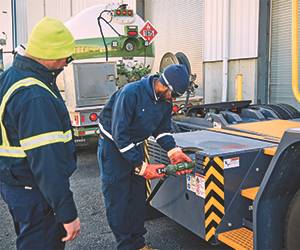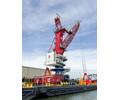
Propane offers unique benefits that extend far beyond emissions and availability.
Ports and other cargo and transportation hubs like airports are the lifelines of global commerce. They keep goods moving, economies growing, and supply chains running smoothly. In the rush toward electrification in recent years, many ports have added electric equipment that relies on the aging grid to operate. Now, a combination of retiring fossil-fuel power plants and surging growth in electricity demand from AI and data centers could increase blackouts by 100 times in 2030, according to the U.S. Department of Energy , leaving supply chains vulnerable to disruption and costly delays.
For operators looking for an efficient, grid-independent alternative, propane delivers a powerful solution that is more cost-effective than electric equipment and also supports long-term emissions reduction goals. From forklifts and terminal tractors to industrial sweepers and backup generators, propane-powered equipment is quietly making waves across America’s ports and similar high-traffic operations like airports, commercial warehouses, and more.
Propane’s Expanding Usage Beyond the Port
Airports, distribution centers, and intermodal railyards share many of the same equipment needs and environmental challenges as ports. These facilities can adopt similar propane-powered solutions to improve operations while meeting clean energy mandates.
Because such operations continue to be under scrutiny for air pollution from ships, trucks, cranes, and material handling equipment, an even cleaner option that is gaining momentum in these markets is renewable propane. Because renewable propane can be used in any existing propane equipment, it offers a clear pathway for facilities looking to reduce their carbon footprint without overhauling their existing infrastructure. This makes renewable propane an excellent solution for future planning and for operations focused on sustainability without sacrificing productivity, and without the need for retrofitting or additional machinery.
Versatile Equipment and Applications
Forklifts and terminal tractors are already well established in propane form, preferred for their fast refueling, long run times, and consistent performance — even in heavy-duty applications. But the opportunities for propane go much further, including:
Cleaner Air Without Sacrificing Power
Ports are densely packed with machinery, vehicles, and personnel — all operating in confined spaces where emissions can quickly add up. While diesel engines contribute significantly to local air pollution and pose operational challenges with noise, maintenance, and refueling, propane offers a cleaner-burning alternative. Propane engines produce up to 94% fewer harmful nitrogen oxide (NOx) emissions than diesel engines and fewer greenhouse gases. Propane also virtually eliminates particulate matter, a critical consideration for facilities aiming to comply with air quality regulations while improving worker safety.
Unique Advantages of Propane
Beyond basic power needs, today’s energy sources must support operational efficiency, meet environmental goals, and ensure safety at every turn. Propane stands out as a fuel that checks all these boxes, offering unique benefits that extend far beyond emissions and availability.
Cost Savings
Propane equipment offers a lower total cost of ownership than diesel, combining fuel cost savings with longer engine life and reduced maintenance. Unlike electric equipment, which may require costly infrastructure upgrades, propane-powered systems are ready to go with minimal setup. And with propane prices remaining more stable than diesel or gasoline, port authorities can better predict fuel costs and manage budget plans.
Reliability
In busy cargo or transportation environments where timing is everything, downtime isn’t just inconvenient, it’s costly. Propane offers operational reliability that helps facilities maintain momentum, even under pressure. Because it’s stored on-site in portable or stationary tanks, propane provides a consistent energy source that isn’t impacted by grid limitations, power outages, or utility constraints.
Flexibility
Compared to electric alternatives, propane systems deliver immediate power without the constraints of charging infrastructure or grid limitations. Propane’s flexibility makes it especially valuable in ports or terminals located in remote areas, or where access to electric infrastructure is limited. There’s no need to wait for expensive utility upgrades or large-scale charging systems, as propane-powered equipment can be implemented immediately with minimal setup.
Safety
When it comes to safety, propane is a proven performer. Propane cylinders and tanks are built to meet rigorous industry standards; and modern safety features such as leak detection systems and automatic shut-off valves help protect workers and property. Unlike diesel or gasoline, propane also doesn’t pose the same spill or contamination risks, making it a safer choice for equipment operating near sensitive cargo, fueling zones, or waterways.
Learn more about propane’s role in the future of clean energy at propane.com/ports 



